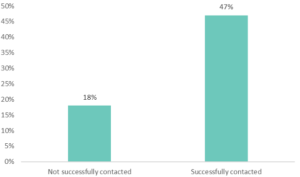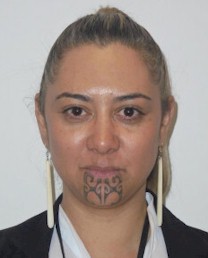By Kaori Takenaka, Matthew Davies, Mahinarangi Hakaraia, Caitlin Spence and Lance Tebbutt
Why Failing to Appear at Court is a Problem
In New Zealand, failing to appear at a scheduled court event can lead to a cascade of negative consequences for individuals, their friends and family, and the criminal justice system. Every time someone misses their court event, there is a high likelihood that a Warrant to Arrest is issued for that person. This costs over US$1 million per year in new court events, and police time is required for processing, transportation and paperwork relating to warrants. There are also significant costs to defendants, as those with active warrants are more likely to be arrested, experience stress and anxiety, risk a reduction of benefit payments and experience disruption to employment.
Across New Zealand, failures to appear increased from around 8% in 2014 to 10% in 2020. The problem is particularly marked in the Eastern District in the North Island, where around 13% of events resulted in a Warrant to Arrest.
The easiest way for defendants to clear their warrant is to make a voluntary appearance at court. For most cases, this enables the court to set a new date and to remove the active warrant from the defendant’s record. However, defendants may not make voluntary appearances for a range of reasons, including a lack of awareness that they have an outstanding warrant for their arrest and fear about what might happen to them at court.
Māori Communities are Disproportionately Affected by this Issue
In New Zealand, also known as Aotearoa, we work within a unique context. The indigenous Māori people of New Zealand make up 16.7% of the population. Unfortunately, generations of systemic inequality has resulted in an overrepresentation of Māori in the criminal justice system. In the Eastern District, where our project was based, there is a higher proportion of Māori than the overall New Zealand average (33% of people in Eastern District are Māori). We also know that Māori are disproportionately impacted by barriers to attending court (79% of people charged with failing to answer bail in 2018 were Māori).
Against this backdrop of inequity within the criminal justice system, our challenge was to design a solution to the problem of Warrants to Arrest that works for the Māori community.
Developing a Behaviourally Informed Solution with Māori Wardens
Behavioural Science Aotearoa (BSA) worked with New Zealand Police and Māori Wardens to design a solution that builds on a proof of concept that police started a few years ago but never evaluated.
The initiative, called Whāriki Haumaru, centres around the role of Māori Wardens. Māori Wardens are a voluntary organisation that have legal responsibilities and often work alongside police and the community. Wardens often have close connections to their communities, and have earned the trust of the public, particularly amongst Māori.
After examining the issue of clearing warrants through a behavioural lens, we chose to develop a solution based on the messenger effect. This is the idea that people respond more positively to information from sources deemed trustworthy and believable. Given the high proportion of Māori in the district, and the positive perception that people have of Māori Wardens, the wardens appeared to be great potential messengers for encouraging people to go to court.
How the Initiative Worked
We developed a phone-based intervention where two Māori Wardens made phone-calls to people with active WTAs and encouraged them to go to court to clear their warrants.
They used a script that we developed using a combination of behavioural science (procedural justice and implementation intentions) and Māori cultural principles (whanaungatanga, pono and manaakitanga). As part of their usual role, the same wardens also attended the District Court and supported people at court if they made a voluntary appearance.
Every week, the wardens and police wrote qualitative reflections and stories based on the calls they made and subsequent voluntary appearances. Data on voluntary appearances were also recorded by court staff via the usual court processes.
Promising Evidence in Support of the Māori Wardens’ Phone Calls

Graph showing the percentage of people who made a voluntary appearance within 2 weeks of being called.
Over the first 5 months of the trial, the wardens called 374 people, of whom 76% were Māori, 17% were European, 4% were Pacific and ethnicity was unknown for 2%. We found statistically significant evidence that people who were called by the wardens were more likely to make a voluntary appearance within two weeks of the phone call (29 percentage point difference).
Graph showing the percentage of people who made a voluntary appearance within 2 weeks of being called.
Although all ethnic groups were more likely to make a voluntary appearance if called, the outcome was stronger for non-Māori than Māori (amongst Māori there was 20 percentage point increase in voluntary appearances for those contacted, compared to a 49 percentage point increase for non-Māori).
We then compared arrest rates for those who were and were not successfully contacted. We did not find a statistically significant difference, although the difference is in a positive direction (8% of people who were successfully contacted were arrested (8 people), compared to 14% of people who were not successfully contacted (38 people)).
We also analysed 55 of the wardens and police’s qualitative reflections, which provided some explanation for the initiative’s promise. Wardens reported that people were often “very happy with the phone call”. In a very small number of cases, the call was received less positively, but the wardens were often able to turn the conversation around. This seems to be because wardens often appeared to go “above and beyond” when offering support (in one example they helped connect a defendant with a potential employer). People also seemed to trust the wardens, as evidenced by the personal details with they shared about their lives. This account demonstrates the positive impact of the wardens’ calls:
“My delivery to her made her feel worthy, putting her mind at ease and hopefully a positive outcome for her. A new court appearance has been set. She was so grateful to have the call and it gave her strength to turn up, without police arrest.”
You can read more about what we learned from the qualitative accounts in our full report.
What Next?
Given the promising findings from this study, we are now working with police to explore testing the intervention in different districts across Aotearoa. This would provide a larger sample size, allowing the intervention to be tested using experimental methods e.g. a randomised control trial. This was not possible for this study due to limited sample size and practical considerations.
Using experimental methods would enable us to explore additional research questions such as: “How effective are phone calls from Māori Wardens compared to others e.g. police officers or other community figures?”, and “Can we establish causation between the intervention and voluntary appearances? Or is it simply that people who are contactable by phone have more trust in authorities (resulting in them picking up the phone), which also makes it more likely for them to go to court voluntarily?”
Whāriki Haumaru was designed specifically with Māori defendants in mind. However, although we found the intervention had positive impacts for all defendants, the effects were weaker for Māori participants. The reasons for this are unknown, but possible reasons include greater challenges in making contact, and greater systemic barriers to attending court e.g. income, employment, transport. Further research will also enable us to examine this in more detail and inform the design of the initiative so it is as effective as possible for Māori defendants.
Finally, most of the defendants in this trial had active Warrants to Arrest because they missed a previous court appearance. Phone calls from Māori Wardens could be used to help avoid people avoid warrants in the first place by encouraging initial court attendance. We would like to test this at an earlier stage in the defendant’s experience of the justice system, as this could have meaningful benefits for the person and the justice system.
This article was edited by Lindsey Horne.





